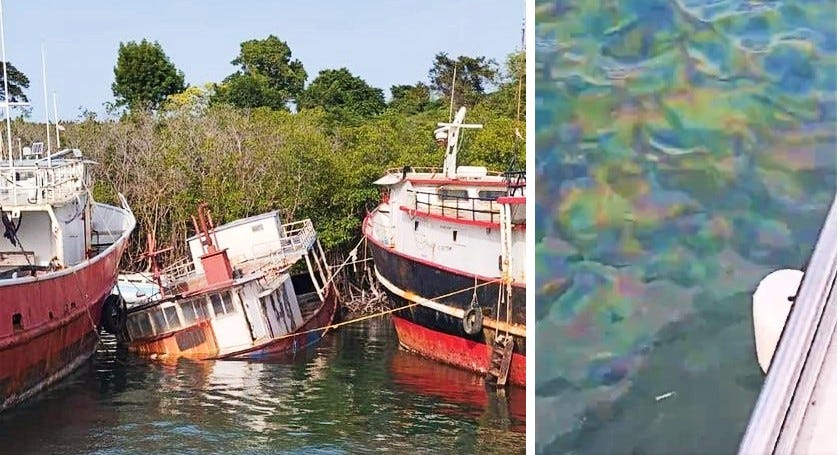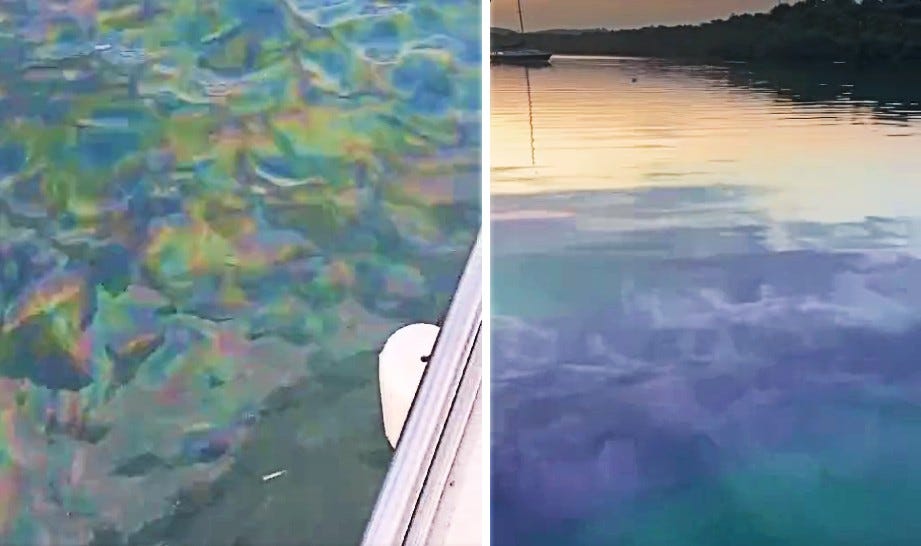D.R.'s National 'Shame' Continues in Diesel-Soaked Luperon Bay
The Fumes Are Sickening. Could They Actually Ignite?

“Shame on us.”—Fernando Capellan
Something mysterious is happening in Luperon Bay. Something just doesn’t add up.
The Dominican Republic is going gangbusters. Her economy is the fastest growing in the Caribbean and, despite a population of only about 11 million, that economy is the ninth largest in Latin America—a category, should you need reminding, that includes Mexico, Brazil and Argentina.
The D.R.’s internationally respected government has set about building new, modern infrastructure all over the place. And, despite challenges, there is a semblance of a growing middle class.
And yet…
Luperon Bay—a wildlife refuge and hurricane hole for foreign cruising sailors —has gone another year as a dumping ground for diesel fuel and bilge waste from a ramshackle fishing fleet, whose operators would have been jailed by now in any other nation.
Currently, about 128 foreign sailors occupy 74 moored or anchored boats in the bay. A few dozen more are in storage at anchor. There are a dozen commercial fishing boats, two tied to the government dock with the rest nestled up close to the mangroves.

Luperon is considered one of the finest hurricane holes in the Caribbean region, thanks to its all around protection and a nearby mountain range that tends to bend the path of hurricanes away from it.
Local leaders have tried mightily to rebrand this city of 17,000 people as a center for “nautical tourism.” But when this boutique concept ran up against mass-tourism, boutique lost. When the nearby city of Puerto Plata became a busy cruise ship destination, officials exiled the fishing fleet to Luperon, loathe to expose cruise-ship tourists to the sight of petroleum-tinted waters and the shabby appearance of the vessels from which it flows.
Recently, Luperon saw a particularly noxious release of fuel, causing a stir among foreign cruisers anchored in the bay. The odor of diesel was so strong people could literally taste it on their tongue.
“Going to vomit,” one cruiser announced. “Must have waited till dark to dump it again. I’m catching a buzz,” said another.

And another: “I hope nobody is smoking in their cockpit or having a BBQ off the stern as there are serious levels of petroleum fumes tonight. Must be another really major oil slick.”
“Fumes of oil are really strong close to Las Velas,” said another foreign sailor, referring to a marina on the bay. “And lightning is coming.”
Maybe the guy was kidding, but fear of lightning causing a surface fire on the bay is not unfounded, according to an American lightning scientist, who specializes in protection systems for boats. Ewen Thomson of Marine Lightning Protection said that a lightning-ignited fire on Luperon Bay may be unlikely but not impossible.
Thomson said the odor of fumes suggests the possibility of an “explosive mixture” at the surface, a condition that could be exacerbated because of the tremendous heat generated by a strike. “If there were diesel on the surface, and lightning struck, the diesel could vaporize and ignite,” Thomson said. “It could spread across the surface like a wave of flame.”
‘La Verguenza’
When the Loose Cannon story of July 12, 2023 was published, Ginette Bournigal was energized to act, according to a string of leaked WhatsApp messages. She is the respected senator representing the province of Puerto Plata in Santo Domingo. When the recent spills reached intolerable levels once again, Loose Cannon sent a WhatsApp message to Bournigal with photo and video documentation of the spill. The video below shows what happens when a few drops of dish soap are sprinkled on the surface:
Days later, Bournigal has not responded.
On January 22, 2023 the Dominican government enacted a management structure for the Luperon Bay Wildlife Refuge with Bournigal and other influencial people playing key roles. Policy for the district was to be made on a public-private basis, with one of the private actors being the Group M Foundation.
Group M is the name of a Dominican textile conglomerate and the largest private employer in the country. The founder is Fernando Capellan, one of the nation’s wealthiest individuals. His family is among a few dozen or so that effectively run the Dominican Republic, regardless of which party is in power. He also happens to have waterfront property on Luperon Bay, where he docks his Sunreef 70 catamaran.
“Shame on us,” Capellan said, when shown the same images as those sent to Bournigal. He said he was working on the problem, which is what he said over a year ago.
How can this problem endure when a person of his influence wants to see it gone, Capellan was asked? He did not answer.

This is the mystery: Spilling diesel into a waterway is illegal in the Dominican Republic like everywhere else in the civilized world. Spilling diesel is contrary to ambitions for the future of Luperon’s economy. Spilling diesel is toxic to the notion of a wildlife refuge. And spilled diesel is staining the waters lapping up against the hull of Capellan’s own $5 million cat.
What About That Fleet?
Mystery invites speculation. The fishing fleet is being “protected” by an unnamed someone because it is oh-so profitable. You hear that time and again.
As a fishing fleet, this one does not have the look of a money-making operation. Sure, fishing craft are industrial in nature, but there is a rhythm in their appearance: It worsens, then is much improved, depending on what stage in the hard-use-then-refit cycle. And at no time during that cycle is chronic leakage of fluids acceptable to reputable owners and captains.
Then, there’s the talk of fishing grounds. Supposedly some of these vessels in Luperon travel around Hispaniola and proceed west to fishing grounds off Honduras or south to other places in the Caribbean Sea—hundreds of miles.
Why can’t these boats be based at ports on the South Coast of the Dominican Republic instead of a wildlife refuge? Why not the big bay of Las Calderas, where the Navy has a headquarters? Barahona, too, has an industrial port and a sizeable sheltered basin. Why not there? The distances to the fishing grounds would be about the same, if not closer.
Bay of Grace, as an Idea
Bahia de Gracias was the name given to Luperon Bay by Christopher Columbus in 1492. In this context, fellow gringos, gracias does not mean “thank you” in Spanish. It's “Bay of Grace” in the sense of divine forgiveness, as in “by the grace of God” or “Amazing Grace.”1 The yearning for grace springs from a belief in inevitable judgement—not just for what you have done, but for what you should have done.
“…how sweet the sound, that saved a wretch like me, etc.”





The simple answer to the fleet being there is the illegal conch fishing that goes on just a few miles north on the remote banks of the Turks and Caicos and Bahamas.
Dominicans treat their boats like they treat their cars. Squeeze the last drop out of money out of them until they break, then leave them in the street (bay). Zero preventative maintenance until they die.